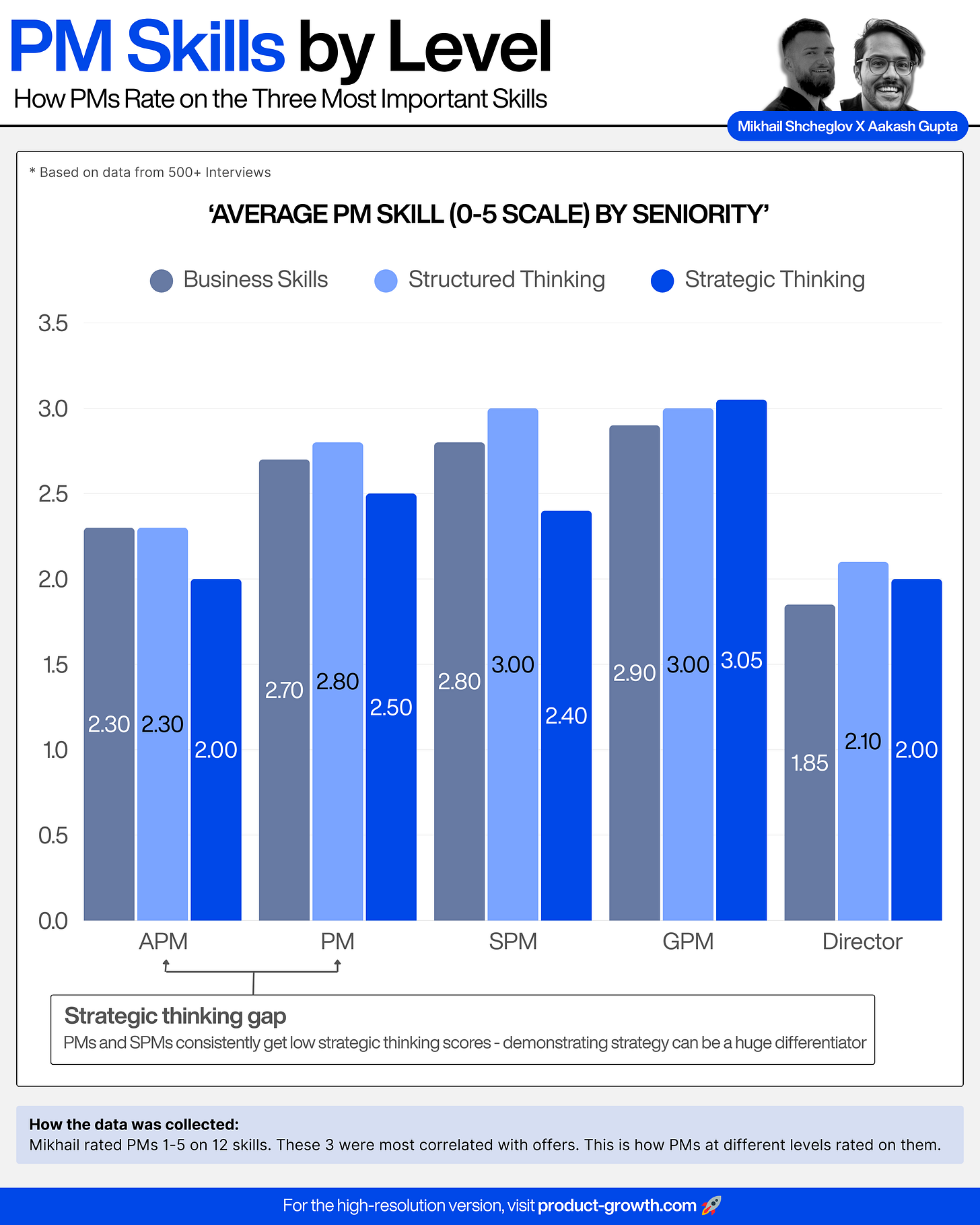What Product Management Interviewers Care About: Insights from 500+ Interviews
In this exclusive dataset of over 500 PM interviews, we break down what PM interviewers actually care about -- so that you can optimize your interview responses and win.
What if you took notes on all of the interviews you’ve ever conducted?
In the newsletter, I try to bring you data that you can’t find anywhere else.
That’s what Mikhail Shcheglov, CPO at Umico—formerly at Bolt, OLX, and Yandex—compiled. He collected and coded the results of over 500 PM interviews he conducted.
In today’s post, we’re going to break down what 500 PM interviews reveal (at least from one interviewer):
The Skills that Drive Offers
How Skills Vary by Level
🔒 How to Read your Interviewer
🔒 Advanced Tactics to Impress Interviewers
🔒 How to Avoid Being Down-Leveled during Interviews
And, if you enjoy this, don’t Mikhail’s Substack, Corporate Waters:
1. The Skills That Drive Offers
Is it business skills or technical skills that matter most? That is the question.
Mikhail coded each person from 1-5 on all these skills. Then, we looked at the correlation of people’s ratings to whether they got an offer or not.
These are the results:
As you can see, business skills rated the highest and technical skills the lowest.
So there you have it. PM roles mirror the change in PM generally:
Business skills—like the ability to think about strategy and impact sizing—really matter
Technical skills are useful—especially in certain roles—but demonstrating them in an interview isn’t going to guarantee an offer
Now let’s go a layer deeper on this data. Let’s look at the top 3 skills, the middle, and the bottom 3.
1.1 The Three Top Skills to Demonstrate in Interviews
The three key skills that had the highest correlation with the positive outcome were business skills, structured thinking, and strategic thinking.
Now, you may be asking, is this only for senior roles?
Interestingly - this was the same across all the seniority levels.
How to Demonstrate Each Skill
Since every PM needs to demonstrate each skill, let’s go deeper on what each is:
Business skills - these are understanding the business model (e.g. marketplaces/SaaS/Ads). To do well here, you need to have a mastery of how to make money and the metrics associated with it.
Structured thinking - this is all about putting a structure to how you navigate cases and how you give answers. Notice how executives generally speak in “the rule of 3”? It works for PM interviews as well.
Strategic thinking - you have to think beyond the feature to analyze market position and create a compelling future of winning monetarily.
You might be nodding, “I already know all this.” Here’s where it gets interesting…
Why People Fail to Demonstrate the 3 Key Skills
Breaking down the interview notes of those who didn’t get coded on those key skills, we noticed 3 predictable patterns:
❌ Forgetting to clarify the goal
Interviewers purposefully conceal the goal. Depending on the goal the case might have different solution structures. Skipping this part and jumping into problem solving is a red flag. It can slide for junior-mid level candidates, but it can be rejection-worthy for Senior/GPM/Director level roles.
❌ Not understanding the business model
Where most candidates crumbled is that they couldn’t differentiate product strategy (build a business) and product design (build a feature). When Mikhail was expecting a candidate to take a step back and look at the bigger picture - the macro, the business model, the operations; most candidates shrinked their responses to the “customer-problem-solution” framework.
❌ Not having a solution framework
Many candidates didn’t outline the solution framework and just randomly jazzed through ideas. They immediately down scored themselves on problem solving. Over the past 5 years there was only a single candidate that managed to crack a case open without sketching down a framework in advance. He was a Director-level candidate. No matter what maturity level you are at, do not risk it.
1.2 The Skills that Help, But Aren’t Most Important
Now, let’s take a look at those skills that got a middling impact rating:
Storytelling
Culture-Fit
Data Fluency
Customer Empathy
People Management Skills
What can we take away from this?
Storytelling Matters
Well, at the top, storytelling is important.
Product managers are the communication hubs that converge business and customer needs with the technical capabilities. If a candidate is too boring and emotionally dry - they will just be less effective.
The key indicator of boredom is when the interviewer loses track of what the candidate is saying. This psychological switch happens with verbose and emotionally dry candidates.
PMs we’ve never hired were the ones who were doing the dry and robotic framework recital.
The ones that we were excited to hire were down to earth, speaking a simple and engaging language.
This is crucial - as hiring managers are expecting to work with a real person.
Above all, storytelling positively correlates with maturity.
The lower maturity candidates tend to compensate for the lack of experience with memorization.
On the flipside, high maturity candidates speak freely from experience and can improvise.
Don’t Get Dinged for Culture-Fit
Interviewers are looking at the candidate through a magnifier lens.
Any sign of toxicity or off behavior would be amplified in high-stress situations during day-to-day work.
Key red flags for are:
Victim vibes towards the past employer
“Know-it-all” attitudes
Blaming or even poking the interviewer
Dilemmas between highly-skilled and culturally off candidates are rare (maybe 1 in a 100). In the absolute majority of cases, such candidates are rejected.
Data, empathy, and people management aren’t that important
All these skills, of course, matter! You can’t be a 0 on data or empathy or people management.
BUT, making these the emphasis of your interview should not be a focus!
When these get rated your top skills, you’re not likely to get the offer.
1.3 The Skills You Shouldn’t Focus on
Three skills rated at the bottom of the correlation:
Creativity
Project Management
Technical Skills
What’s the takeaway?
All of these matter, but none will win you an offer.
Creativity Isn’t Enough (On Its Own)
Being creative or thinking out of the box is a relevant skill, but on its own it will not grant you an offer.
Some candidates played it to their advantage by suggesting both “low-effort mvp” and a “moonshot” solution for the problem.
However, in most cases, creativity by itself is not a key skill required of a product manager.
Project Management can be a Red flag
Sometimes we all have to put on a project management hat and execute the milestone by the deadline.
But project management skills themselves have very little impact on your chances of getting an offer.
On the contrary, putting too much emphasis on project management, agile and similar certifications can backfire.
We personally treat it as a mild red flag during the CV review stage.
Technical Skills Only Matter for Technical Roles
Technical skills have the lowest impact on the outcomes of the offer.
You need to understand the basic concepts, but no one would expect you to code or be well versed in technical architecture.
There are platform/technical product roles—that’s the case where this changes.
And that concludes our skills x offer analysis. Now let’s look at skills a different way…
2. How Skills Vary by Level
The data reveals fascinating patterns across seniority levels.
Here’s how PMs did on the top 3 most important skills:
The data reveals some predictable - but also insightful things.
Strategic Thinking Is a Differentiator
PM and SPM candidates consistently rated poorly on strategic thinking (averages of 2 and 2.5 respectively).
This goes to show how much you can differentiate yourself at early stages by demonstrating strategy.
Here’s how:
Always bring it back to the bigger picture before you end a case
Show an awareness of how the business wins, not just products and features
Not that Many People Have Great Business Skills
The big trend in PM right now is to demand more business impact, impact sizing, and growth modeling from PMs.
But of the three important skills, people tend to score pretty poorly on it.
So if you can talk about:
How you built a growth model
How you might estimate business metrics from product metrics
You’ll have a big leg up on the competition.
Expectations rise
What makes for successful APMs differs dramatically from what makes successful Directors.
For junior roles, execution and customer empathy carry the day. As you rise to senior levels, the entire evaluation framework shifts—strategic vision and business impact become paramount.
At Director level, something fascinating happens in the data: scores drop across all skills, not because Directors lack capability, but because they're measured against an entirely different standard.
So if you’re at this senior level, pay especially close attention to the three key skills.
And that covers our ‘by level’ analysis. Now let’s move to what we can learn about interviewers…
3. How to Read your Interviewer
There’s some fascinating sings your interviewer is giving you. You just have to read them right. Here’s how:
Keep reading with a 7-day free trial
Subscribe to Product Growth to keep reading this post and get 7 days of free access to the full post archives.





